九年级英语Unit 5 Great people文章 爱因斯坦冀教版
- 格式:doc
- 大小:23.50 KB
- 文档页数:1
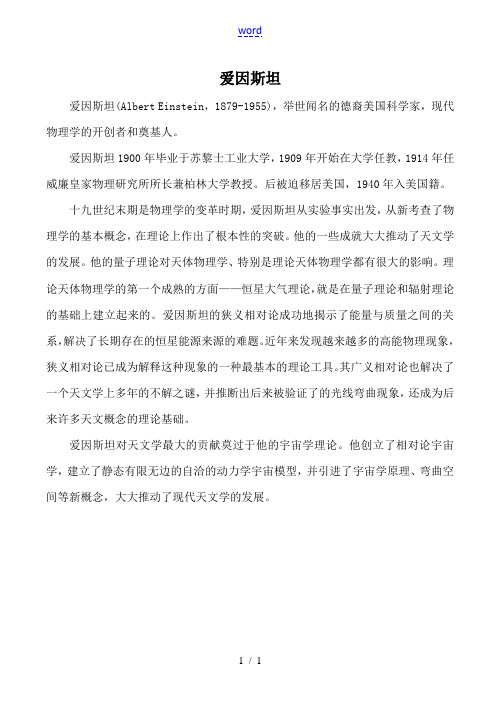
word
爱因斯坦
爱因斯坦(Albert Einstein,1879-1955),举世闻名的德裔美国科学家,现代物理学的开创者和奠基人。
爱因斯坦1900年毕业于苏黎士工业大学,1909年开始在大学任教,1914年任威廉皇家物理研究所所长兼柏林大学教授。
后被迫移居美国,1940年入美国籍。
十九世纪末期是物理学的变革时期,爱因斯坦从实验事实出发,从新考查了物理学的基本概念,在理论上作出了根本性的突破。
他的一些成就大大推动了天文学的发展。
他的量子理论对天体物理学、特别是理论天体物理学都有很大的影响。
理论天体物理学的第一个成熟的方面——恒星大气理论,就是在量子理论和辐射理论的基础上建立起来的。
爱因斯坦的狭义相对论成功地揭示了能量与质量之间的关系,解决了长期存在的恒星能源来源的难题。
近年来发现越来越多的高能物理现象,狭义相对论已成为解释这种现象的一种最基本的理论工具。
其广义相对论也解决了一个天文学上多年的不解之谜,并推断出后来被验证了的光线弯曲现象,还成为后来许多天文概念的理论基础。
爱因斯坦对天文学最大的贡献莫过于他的宇宙学理论。
他创立了相对论宇宙学,建立了静态有限无边的自洽的动力学宇宙模型,并引进了宇宙学原理、弯曲空间等新概念,大大推动了现代天文学的发展。
1 / 1。
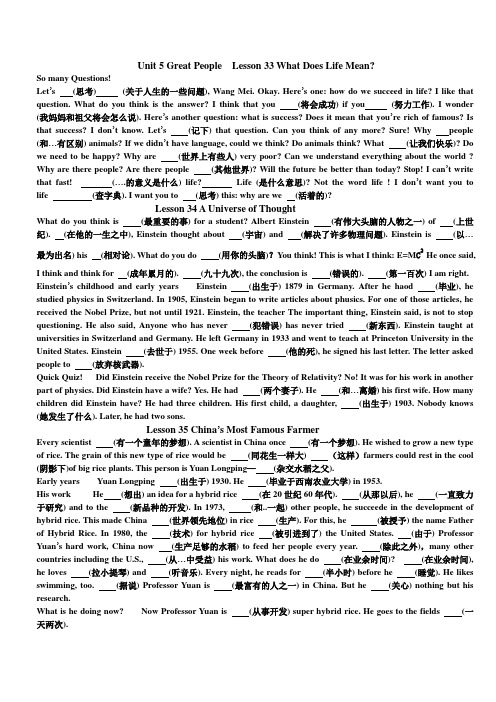
Unit 5 Great People Lesson 33 What Does Life Mean?So many Questions!Let’s (思考) (关于人生的一些问题), Wang Mei. Okay. Here’s one: how do we succeed in life? I like that question. What do you think is the answer? I think that you (将会成功) if you (努力工作). I wonder (我妈妈和祖父将会怎么说). Here’s another question: what is success? Does it mean that you’re rich of famous? Is that success? I don’t know. Let’s (记下) that question. Can you think of any more? Sure! Why people (和…有区别) animals? If we didn’t have language, could we think? Do animals think? What (让我们快乐)? Do we need to be happy? Why are (世界上有些人) very poor? Can we understand everything about the world ? Why are there people? Are there people (其他世界)? Will the future be better than today? Stop! I can’t write that fast! (….的意义是什么) life? Life (是什么意思)? Not the word life ! I don’t want you to life (查字典). I want you to (思考) this: why are we (活着的)?Lesson 34 A Universe of ThoughtWhat do you think is (最重要的事) for a student? Albert Einstein (有伟大头脑的人物之一) of (上世纪). (在他的一生之中), Einstein thought about (宇宙) and (解决了许多物理问题). Einstein is (以…最为出名) his (相对论). What do you do (用你的头脑)?Y ou think! This is what I think: E=M C2He once said,I think and think for (成年累月的). (九十九次), the conclusion is (错误的). (第一百次) I am right. Einstein’s childhood and early years Einstein (出生于) 1879 in Germany. After he haod (毕业), he studied physics in Switzerland. In 1905, Einstein began to write articles about phusics. For one of those articles, he received the Nobel Prize, but not until 1921. Einstein, the teacher The important thing, Einstein said, is not to stop questioning. He also said, Anyone who has never (犯错误) has never tried (新东西). Einstein taught at universities in Switzerland and Germany. He left Germany in 1933 and went to teach at Princeton University in the United States. Einstein (去世于) 1955. One week before (他的死), he signed his last letter. The letter asked people to (放弃核武器).Quick Quiz! Did Einstein receive the Nobel Prize for the Theory of Relativity? No! It was for his work in another part of physics. Did Einstein have a wife? Y es. He had (两个妻子). He (和…离婚) his first wife. How many children did Einstein have? He had three children. His first child, a daughter, (出生于) 1903. Nobody knows (她发生了什么). Later, he had two sons.Lesson 35 China’s Most Famous FarmerEvery scientist (有一个童年的梦想). A scientist in China once (有一个梦想). He wished to grow a new type of rice. The grain of this new type of rice would be (同花生一样大) (这样)farmers could rest in the cool (阴影下)of big rice plants. This person is Yuan Longping—(杂交水稻之父).Early years Yuan Longping (出生于) 1930. He (毕业于西南农业大学) in 1953.His work He (想出) an idea for a hybrid rice (在20世纪60年代). (从那以后), he (一直致力于研究) and to the (新品种的开发). In 1973, (和..一起) other people, he succeede in the development of hybrid rice. This made China (世界领先地位) in rice (生产). For this, he (被授予) the name Father of Hybrid Rice. In 1980, the (技术) for hybrid rice (被引进到了) the United States. (由于) Professor Yuan’s hard work, China now (生产足够的水稻) to feed her people every year. (除此之外),many other countries including the U.S., (从…中受益) his work. What does he do (在业余时间)? (在业余时间), he loves (拉小提琴) and (听音乐). Every night, he reads for (半小时) before he (睡觉). He likes swimming, too. (据说) Professor Yuan is (最富有的人之一) in China. But he (关心) nothing but his research.What is he doing now? Now Professor Yuan is (从事开发) super hybrid rice. He goes to the fields (一天两次).Lesson 36 Make the world a better placeY ou (成为一名英雄), When you (关心) those around you. (树立一个好的榜样),(日复一日). This (牙医) helps other people, (因为) she (修牙). Do we all need to do things that other people?Do we need to travel and (交新朋友)? Does that make the world a better place?Lesson 37 Touch the worldHelen Keller, (众所周知的作家和教育家), died yesterday (在88岁时). Helen Keller was a hero to (盲人和聋哑人) (全世界). Helen (出生于) 1880 in the United States. When she was nineteen months old, Helen (生病了). She (发高烧). It made her blind and deaf. Before her illness, Helen had been a bright and happy girl. When she (失去视力和听力), she became difficult and wild. Helen wanted to understand other people. Sometimes, she stood (她妈妈和爸爸之间). She put her hands on their mouths. She could feel them talk. She felt one mouth move, and then (另一张嘴) move. What were they doing? Helen didn’t know. She shouted and cried. In 1887, a young teacher, Anne Sullivan, began to help Helen. She spelled words on Helen’s hand(用她的手指). (起初) the words didn’t mean anything to Helen. Then, one day, Helen was playing in some water. Anne Sullivan spelled W-A-T-E-R onto Helen’s hand. Suddenly, Helen understood. That day, she learned many more words: mother, father, sister—and teacher. (随着) Helen grew older, she learned to read. She had special books with letters she could touch. She also learned to write and even speak. When Helen studied at university, Anne Sullivan sat beside her. She (听) the professor s’ words, and then spelled their words onto Helen’s hand. After Helen finished university, she visited many countris. She spoke about her life. She (以…有名) (她的勇气)and hard work. She (尽她最大努力) to help other people who were deaf or blind. She (会被深深怀念的).Lesson 38 To China, with LoveNorman Bethune (出生于) Canada in 1890. He was a famous doctor and a nice man. Why is Norman Bethune famous? He is famous for: Finding new ways to help people with T.B.--- disease that damages the lungs. Working (作为战地医生). Inveting tools that doctors still use today. T ravelling to China. Norman Bethune (因….著名) helping Chinese people (在抗日战争中). In 1938, Bethune went to (中国北部), as he knew many people (正面临死亡) in the Anti-Japanese War. Bethune (组织了) hospital, taught doctors and nurses, and showed people (如何进行急救). He (死于) China in 1939. In China, Norman Bethune is a hero. People remember how hard he worked to help others, (日复一日的) (在困难的情况下). He once (做手术) for sixty-nine hours (不间断地). Norman Bethune (葬于唐县), Hebei Province. Shijiazhuang has the Bethune Medical School and the Bethune (国际和平医院). Canada remembers Norman Bethune, too. His house in Canada is a museum.Quick Quiz! Did Norman Bethune meet Mao Zedong? Y es, he met Mao once, in 1938. Bethune was (在去中国北部的路上), (因为) he wanted to help the people of China in the Anti-Japanese War. What (杀死) Bethune? Bethune (死于血液中毒). He had been (给…做手术) (一名受伤的战士)when he (意外的) cut his hand.Lesson 39 Guess My Hero, Danny!Monday, November 12Dear Danny,This week in class, we talked about success. We studied famus people and talked about (我们最喜欢的英雄). (今年早些时候), I had told Ms. Liu that I would like to help her teach our English class. (在星期一), she (让我做一个纵横字谜的例子). I thought it (很有趣) (因为)I had done a lot of crossword puzzles when I was in Canada. But (谁) would my puzzle be about? (日复一日的), I (问我自己) that question. I (思考它) as I walked to school. I (思考它) later as I walked home. Then I (有一个好主意). My puzzle wouldn’t be about (某个名人). But it would be about somebody who wants to be famous. I’m sending you the puzzle so you can try to guess (那是谁). Li MingT uesday, November 20Hi, Li Ming,I loved your puzzle! Y ou (选择了一个非常好的英雄). I hope he will be famous (某一天). I showed the puzzle to Jenny and Brian as we ate our lunch today. I told them that the puzzle was about a very great person. I said that this person (和他们生于同一年) they were. They couldn’t guess, so I helped them. I said that the person’s favourite food (是) a donut. (五分钟后), they had finished (整个谜语). I told them that you had made it for me. Thanks, Li Ming. Y our puzzle was fun! Danny。
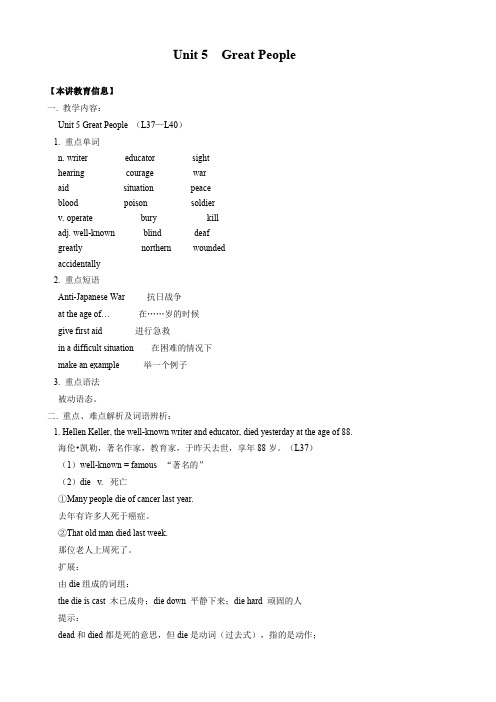
Unit 5 Great People【本讲教育信息】一. 教学内容:Unit 5 Great People (L37—L40)1. 重点单词n. writer educator sighthearing courage waraid situation peaceblood poison soldierv. operate bury killadj. well-known blind deafgreatly northern woundedaccidentally2. 重点短语Anti-Japanese War 抗日战争at the age of…在……岁的时候give first aid 进行急救in a difficult situation 在困难的情况下make an example 举一个例子3. 重点语法被动语态。
二. 重点、难点解析及词语辨析:1. Hellen Keller, the well-known writer and educator, died yesterday at the age of 88.海伦•凯勒,著名作家,教育家,于昨天去世,享年88岁。
(L37)(1)well-known = famous “著名的”(2)die v. 死亡①Many people die of cancer last year.去年有许多人死于癌症。
②That old man died last week.那位老人上周死了。
扩展:由die组成的词组:the die is cast 木已成舟;die down 平静下来;die hard 顽固的人提示:dead和died都是死的意思,但die是动词(过去式),指的是动作;dead是形容词,指的是状态。
另外,die是瞬间动词,不能和表示一段时间的词语连用,若要用,需要be dead 来替换。
如:③This little animal has died. 这个小动物昨天死的。

[ti:UNIT 5 Great People Lesson 33 What Does Life Mean?][0:00.946]UNIT 5 第五单元[0:02.521]Great People 伟人[0:04.285]Lesson 33: 第三十三课:[0:06.091]What Does Life Mean? 人生意味着什么?[0:08.785]THINK ABOUT IT![0:10.323]Do you have a happy life?[0:12.434]Why or why not?[0:15.457]What are your dreams for the future?[0:18.728]What is Wang Mei's idea about "success in life"?[0:23.609]So Many Questions! 如此多的问题![0:26.139]Let's think of some questions about life, Wang Mei. 王梅,我们来想想关于人生的问题吧。
[0:29.276]Okay. 好的。
[0:30.177]Here's one: how do we succeed in life? 这儿有一个:我们在生活中是怎样成功的?[0:34.233]I like that question. 我喜欢这个问题。
[0:35.845]What do you think is the answer? 你认为答案是什么?[0:37.924]I think that you will succeed if you work hard. 我想如果你努力的话,就会成功。
[0:41.390]I wonder what my mother and grandfather will say. 我想知道我的妈妈和外公会怎样说。
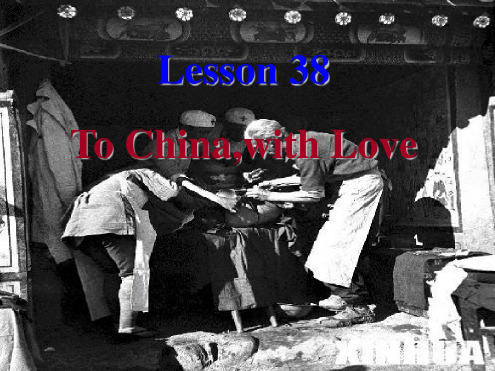
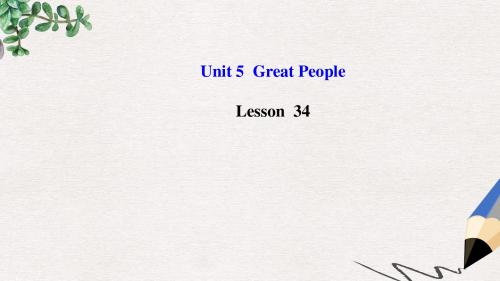
爱因斯坦的学生时代艾伯特·爱因斯坦于1879年3月14日在德国小城乌尔姆出生,他的父母都是犹太人。
爱因斯坦有一个幸福的童年,他的父亲是位平静、温顺的好心人,爱好文学和数学。
他的母亲个性较强,喜爱音乐,并影响了爱因斯坦,爱因斯坦从六岁起学小提琴,从此小提琴成为他的终生伴侣。
爱因斯坦的父母对他有着良好的影响和家庭教育,家中弥漫着自由的精神和祥和的气氛。
和牛顿一样,爱因斯坦年幼时也未显出智力超群,相反,到了四岁多还不会说话,家里人甚至担心他是个低能儿。
六岁时他进入了国民学校,是一个十分沉静的孩子,喜欢玩一些需要耐心和坚韧的游戏,例如用纸片搭房子。
1888年进入了中学后,学业也不突出,除了数学很好以外,其他功课都不怎么样,尤其是拉丁文和希腊文,他对古典语言毫无兴趣。
当时的德国学校必须接受某某教育,开始时爱因斯坦非常认真,但当他读了通俗的科学书籍后,认识到某某里有许多故事是不真实的。
12岁时他放弃了对某某的信仰,并对所有权威和社会环境中的信念产生了怀疑,并发展成一种自由的思想。
爱因斯坦发现周围有一个巨大的自然世界,它离开人类独立存在,就象一个永恒的谜。
他看到,许多他非常尊敬和钦佩的人在专心从事这项事业时,找到了内心的自由和安宁。
于是,少年时代的爱因斯坦就选择了科学事业,希望掌握这个自然世界的奥秘,而一旦选择了这一道路,就坚持不懈地走了下去,从来没有后悔过。
1895年,爱因斯坦来到瑞士苏黎世,准备投考苏黎世的联邦工业大学,虽然他的数学和物理考得很不错,但其他科目没有考好,学校校长推荐他去瑞士的阿劳州立中学学习一年,以补齐功课。
在阿劳州立中学的这段时光中使爱因斯坦感到快乐,他尝到了瑞士自由的空气和阳光,并决心放弃德国国籍。
1896年,爱因斯坦正式成为一个无国籍的人,并考进了联邦工业大学。
大学期间,爱因斯坦迷上了物理学,一方面,他阅读了德国著名物理学家基尔霍夫、赫兹等人的著作,钻研了麦克斯韦的电磁理论和马赫的力学,并经常去理论物理学教授的家中请教。
人物介绍:爱因斯坦早期工作1900年,爱因斯坦从苏黎世工业大学毕业。
由于他对某些功课不热心,以及对老师态度冷漠,被拒绝留校。
他找不到工作,靠做家庭教师和代课教师过活。
在失业一年半以后,关心并了解他才能的同学马塞尔·格罗斯曼向他伸出了援助的手。
格罗斯曼设法说服自己的父亲把爱因斯坦介绍到瑞士专利局去作一个技术员。
爱因斯坦终身感谢格罗斯曼对他的帮助。
在悼念格罗斯曼的信中,他谈到这件事时说,当他大学毕业时,“突然被一切人抛弃,一筹莫展的面对人生。
他帮助了我,通过他和他的父亲,我后来才到了哈勒(时任瑞士专利局局长)那里,进了专利局。
这有点像救命之恩,没有他我大概不致于饿死,但精神会颓唐起来。
”1902年2月21日,爱因斯坦取得了瑞士国籍,并迁居伯尔尼,等待专利局的招聘。
1902年6月23日,爱因斯坦正式受聘于专利局,任三级技术员,工作职责是审核申请专利权的各种技术发明创造。
1903年,他与大学同学米列娃·玛丽克结婚。
1900年-1904年,爱因斯坦每年都写出一篇论文,发表于德国《物理学杂志》。
头两篇是关于液体表面和电解的热力学,企图给化学以力学的基础,以后发现此路不通,转而研究热力学的力学基础。
1901年提出统计力学的一些基本理论,1902年-1904年间的三篇论文都属于这一领域。
1904年的论文认真探讨了统计力学所预测的涨落现象,发现能量涨落取决于玻尔兹曼常数。
它不仅把这一结果用于力学体系和热现象,而且大胆地用于辐射现象,得出辐射能涨落的公式,从而导出维恩位移定律。
涨落现象的研究,使他于1905年在辐射理论和分子运动论两方面同时做出重大突破。
1905年的奇迹1905年,爱因斯坦在科学史上创造了一个史无前例奇迹。
这一年他写了六篇论文,在3月到9月这半年中,利用在专利局每天八小时工作以外的业余时间,在三个领域做出了四个有划时代意义的贡献,他发表了关于光量子说、分子大小测定法、布朗运动理论和狭义相对论这四篇重要论文。
爱因斯坦
爱因斯坦(Albert Einstein,1879-1955),举世闻名的德裔美国科学家,现代物理学的开创者和奠基人。
爱因斯坦1900年毕业于苏黎士工业大学,1909年开始在大学任教,1914年任威廉皇家物理研究所所长兼柏林大学教授。
后被迫移居美国,1940年入美国籍。
十九世纪末期是物理学的变革时期,爱因斯坦从实验事实出发,从新考查了物理学的基本概念,在理论上作出了根本性的突破。
他的一些成就大大推动了天文学的发展。
他的量子理论对天体物理学、特别是理论天体物理学都有很大的影响。
理论天体物理学的第一个成熟的方面——恒星大气理论,就是在量子理论和辐射理论的基础上建立起来的。
爱因斯坦的狭义相对论成功地揭示了能量与质量之间的关系,解决了长期存在的恒星能源来源的难题。
近年来发现越来越多的高能物理现象,狭义相对论已成为解释这种现象的一种最基本的理论工具。
其广义相对论也解决了一个天文学上多年的不解之谜,并推断出后来被验证了的光线弯曲现象,还成为后来许多天文概念的理论基础。
爱因斯坦对天文学最大的贡献莫过于他的宇宙学理论。
他创立了相对论宇宙学,建立了静态有限无边的自洽的动力学宇宙模型,并引进了宇宙学原理、弯曲空间等新概念,大大推动了现代天文学的发展。